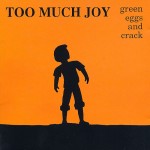“To create / You must destroy / Smash a glass and cry, “Too Much Joy!” – the most obscure lyrics from an obscure band in the history of ever.
 One of the few rules of writing that I not only can coherently form in my mind but actually follow goes something like this: A good story is where you spend the first half building a world and the second half destroying it. The exact percentages aren’t always the same. Just the act of completely tearing down everything you’ve created.
One of the few rules of writing that I not only can coherently form in my mind but actually follow goes something like this: A good story is where you spend the first half building a world and the second half destroying it. The exact percentages aren’t always the same. Just the act of completely tearing down everything you’ve created.
The worst thing in the world for a story is status quo. Once you establish a universe, a world, a Rube Goldberg Machine of your own imagination, the urge to protect it is pretty strong. You want to preserve it in amber because it’s good, other people think it’s good, and you did a fine job of building it, so why not.
But you have to destroy it all. Burn everything. The story only gets truly interesting when you start manufacturing Molotovs in the basement and hurling them at your beautiful story. That’s why, in the Avery Cates books I purposefully told the story of a world in decline and then finally in death throes. I enjoyed creating that world in the first book, and then really enjoyed destroying it in books 2-5. If you don’t destroy, you’re just treading water. And it gets boring.
You have to take away the powers you gave your hero. You have to destroy the bedrock of the society you’ve envisioned. You have to rain plague and defeat and horror down on everyone, kill your main characters, drop the bomb, and leave nothing behind.
One reason the TV show Mad Men is still considered one of the best shows on TV after 6 seasons is because Matt Weiner and company knows this. In each season of that show, he has violently changed the circumstances. In Season 1, Don Draper’s mysterious past is set up as this defining mystery – and then revealed, and no one cared. Over the course of the seasons Don’s marriage has broken up, his company was bought, he formed his own, he got married again, he lost his creative edge, he mismanaged things, he caused his brother to commit suicide, he got fired. Mad Men has been burning to the ground since about episode seven of Season One, which is about right. That was about the time the universe Weiner was working on was pretty much fleshed out for us.
A lesser show would still be trying to work that early-60s style angle. A lesser show would always end on a note of triumph as Don pulls another bit of brilliance out of the air. Instead, Don’s losing everything in slow motion, over and over again. And that’s why it’s interesting.
So, next time you’re stuck in a story and not sure why it’s dead on the page, ask yourself if it couldn’t benefit from a sudden wildfire that would leave behind nothing but bones and ash. Chances are, it would.
